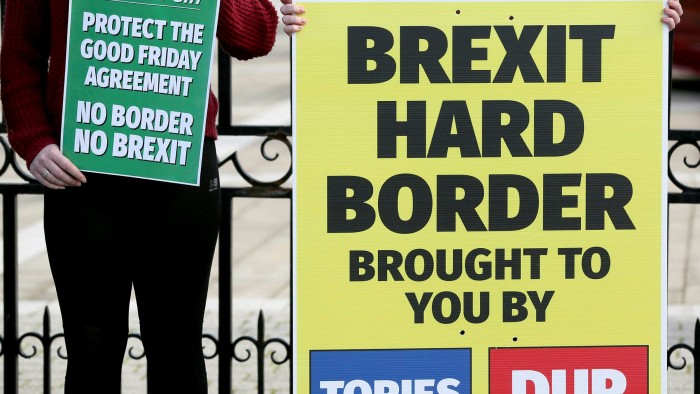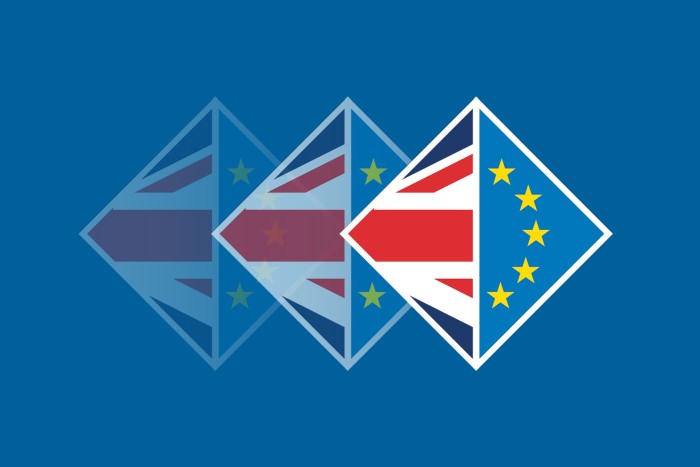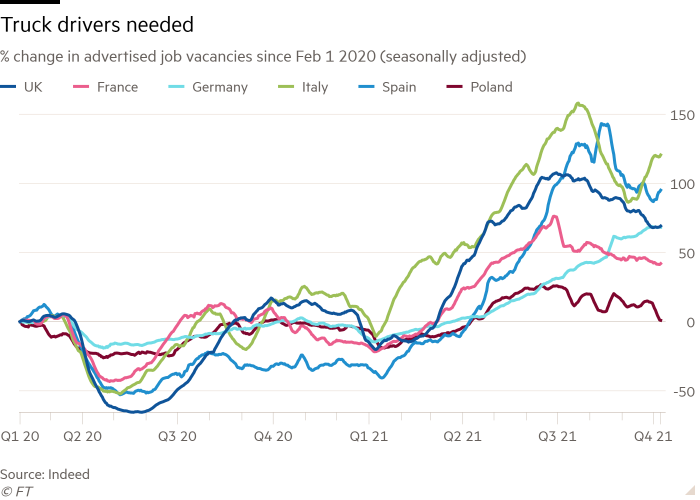A week of 2019 flashbacks

This article is an on-site version of our Britain after Briefing newsletter. Sign up here to get the newsletter sent straight to your inbox every week
Good afternoon, and welcome to the restyled “Britain after Brexit” newsletter, which — the clue is in the title — will be a forward-leaning look at how the UK is adapting to its new life outside the EU single market and customs union.
Of course, even as we try and look forward, Brexit has a habit of dragging us back into old arguments. This week, the ructions of the Northern Ireland protocol has given everyone flashbacks to 2019. Brexit is over . . . long live Brexit!
But seriously. What happens next on the Northern Ireland file? The short answer is some weeks of intense negotiations and lobbying, after which the British side will have to decide whether they have won enough, or want to trigger Article 16 to suspend parts of the protocol.
Last week the newsletter framed the wider tactical choices facing Brexit minister Lord David Frost and Prime Minister Boris Johnson, and the possible consequences of imperilling Ireland’s place in the single market by not enforcing an Irish Sea border.
This week those choices have got a little tougher thanks to some slightly inept statecraft on the UK side.
First Frost went to Lisbon and delivered an uncompromising speech that only served to harden hearts in EU capitals, and then Brussels won the first round of the briefing war by producing a package of measures to reduce Irish Sea border friction that surprised on the upside.
Actually, as Raoul Ruparel, a former Europe adviser to Theresa May observed, the EU concessions are rather less dramatic than they first appear — and, of course, do nothing to address Frost’s broader demand to remove the oversight of the European Court of Justice from the deal.
Still, the narrative is out there that the EU has reduced “80 per cent” of Irish Sea border frictions. This will make it harder for Frost to justify using Article 16 to reclaim British sovereignty, particularly if Northern Ireland’s business community publicly approves of the EU’s offer of border easements.
Ultimately, it will depend on which constituency Frost really wants to address — the Conservative purists such as David Davis who argue that leaving Northern Ireland in the regulatory orbit of the EU is simply intolerable, or the broader alliance of pragmatists who want the protocol to work for Northern Ireland.
Frost will, of course, argue that the deal can never be “practical” if it is rejected by the Unionist community in Northern Ireland (and it was, again, after the EU offer) but equally the ECJ issue has never really been uppermost in the minds of the Democratic Unionist party.
The more of the practical elements that can be agreed, the harder it becomes to land arguments on the ECJ and the Article 10 clause on state aid being a deal-breaker. This is particularly so since arguments around legal jurisdictions are more technical and abstruse than the “sausage wars” prism through which much of this is reported in the pro-Brexit press.
We will just have to see how the lobby and negotiating plays out — I would still bet on a high chance the UK reaches for Article 16, but there is also a chance now to step back.
Britain after Brexit newsletter

Keep up to date with the latest developments, post-Brexit, with original weekly insights from our public policy editor Peter Foster and senior FT writers. Sign up here.
But enough (for now) of these careworn arguments. Northern Ireland is not the only perpetually unfinished business of Brexit. The other question is when the so-called Brexit dividend will land: what will our newfound freedoms from Brussels deliver in real terms?
Frost made great play of this area in his Lisbon speech, telling the EU that it needed to embrace the “healthy competition” that Brexit has enabled, rather than the European Commission trying churlishly to obstruct and impede — as he sees it — the progress of Global Britain.
A big part of this, Frost said, is that the UK is “actively looking at areas where we have inherited EU rules that we regard as unnecessarily complex, bureaucratic” and replacing them. “In Britain people voted for change. That’s what they expect and that’s what’s happening,” he said.
But is it happening? Good question. There is certainly plenty of talk about regulatory dividends, but there are so many areas of regulation and they are so darned complex that it is, truthfully, very difficult to keep tabs on what is — or is not — changing.
But help is at hand. The UK in a Changing Europe think-tank, at the behest of the House of Lords European affairs committee has created a “UK-EU Regulatory Divergence Tracker” which brings together where changes are taking place, and where they are not.
In previous newsletters, we have tackled the post-Brexit data regime, the future of medical device regulation, UKCA markings, financial services and the concept of a new regulatory science, but the gamut of possibilities runs far wider.
The tracker, which at present runs to 34 pages and will be published next Monday here, has been collated by researcher Joël Reland with Whitehall specialist Jill Rutter and Professor Anand Menon. It will be updated quarterly by Reland as Britain starts to slough off the regulatory barnacles of Brussels, or tries to.
Britain after Brexit has been given a sneak preview of the document and it makes for interesting reading, partly because it shows how far we still have to go, and how piecemeal the approach has been to date.
It splits divergence into three categories:
Active — where the UK is looking to change exists rules, for example on fintech or data regulation
Passive — where the EU is creating new rules and the UK chooses not to immediately follow, for example, a carbon border tax
Procedural — where the substance remains much the same for now but the UK has created its own system to implement, for example, UKCA markings or UK’s £1bn copycat version of the Reach chemicals database.
Reland says the experience of putting the tracker together showed that most of the change, at the moment, is passive and where there are active plans — for example, data, medical devices or fintech — those plans are still in development or consultation.
And where there are plans for a bespoke regime, he adds, industry and regulators quickly find themselves grappling with tough trade-offs, since the UK market is not commercially big enough often to justify setting up a bespoke regulatory regime.
“The big picture is that even what feels like a small piece of ‘active’ divergence can have quite profound consequences. You may just want to cure a few EU regulations to allow churches to advertise their jumble sales, but in the process you can risk valuable assets, like the EU’s data adequacy finding,” he said.
This is not to be defeatist. We are in early days and Reland bets that while the current list is, as he puts it, “based on a sporadic and idiosyncratic wishlist of stuff picked out by various departments”, the government machine will start to focus in the fullness of time.
“My sense is that we will hear about a few more concentrated issues as time goes on,” he said. “We’ve got lots of reviews undertaken by different government departments, so, we’re still in early days, surveying the field.”
The good news is that someone will now be keeping tabs on it all.
Before we go any further, I wanted to tell you about an upcoming FT Live event. World Trade Organization director-general Ngozi Okonjo-Iweala, Channel 4’s chief executive Alex Mahon, Belarusian opposition leader Sviatlana Tsikhanouskaya and others will be speaking at this year’s Women at the Top Europe event at FT HQ on October 20-21. If you would like to attend, register here.
Brexit in numbers

Britain continues to grapple with shortages and supply chain crunches caused by a heady cocktail of Covid-19, port congestion and a lack of heavy goods vehicle drivers that have been exacerbated by Brexit and the ending of free movement.
As my colleagues Martin Arnold and Alexander Vladkov report, the number of UK truck drivers dropped year on year by 29,000, or nearly 10 per cent, in the year to March, according to the Office for National Statistics. More than half of the drop was owing to a 36 per cent decline in the number of EU citizens working as drivers in the UK, the ONS said.
What is interesting is that EU countries (see chart above) are also crying out for drivers and have suffered their own long-running shortages which are now reaching “dangerous” levels.
These have yet to manifest themselves as starkly in the EU as they have in the UK. As has been observed, while freedom of movement has created political problems for some EU members, it does create flexibility in the EU labour market that the UK — as it is now discovering after Brexit — no longer enjoys.
Still, Brexiters might argue that by experiencing higher pain now, the UK will be forced to move to fix its problems with more training, higher wages and better conditions, while the EU continues to muddle along. But like the regulatory dividend, we will have to wait and see if it ever really happens.
Please keep your feedback coming. Email me at brexitbrief@ft.com.
And, finally, three unmissable Brexit stories
After his interview with Nicola Sturgeon, Robert Shrimsley assesses the Scottish National party’s chances of securing a second independence referendum in his latest column. “If the nationalist tide does not soon ebb,” he writes, “it will have to be confronted.”
Sir Jeffrey Donaldson, leader of the Democratic Unionist party since June, is at the centre of the battle over the Northern Ireland protocol. He spoke to our Ireland correspondent, Jude Webber, ahead of yesterday’s EU announcement.
Boris Johnson’s £250m “trade yacht” is to be deemed to have a “national security” role, in a move that would allow it to be built in a British shipyard without going out to international tender. Find out more about this controversial project.
Comments